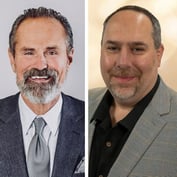Last week, I helped the team over at BenefitsPro cover their Benefits Selling Expo in San Diego, where I sat in on two very different keynote presentations dealing with change.
In one, speaker and author Karl Schoemer beat the drum for rapid adaptation. His main point: in our increasingly dynamic world, professionals and companies are either changing … or becoming irrelevant.
In the other, former Senator Rick Santorum made the case for sticking with the old. (Perhaps an unsurprising argument from a guy who still sports sweater vests and a haircut made popular by Opie Taylor.) He encouraged producers to fight PPACA and lamented modern changes to marriage and religion.
Both speakers seemed to connect with the audience — but I couldn’t help feeling like both had also done those agents a disservice.
Why do we have to talk about change in such radical terms? Across industries and across platforms — whether conference keynotes or blogs — you’ll find talking heads on one end or the other of the change spectrum.
Some spend all their time throwing out gasp-inducing statistics and relaying business horror stories to whip up fear about the radical changes we’re experiencing. The others preach the tried-and-true, acting like the Internet is this decade’s Pet Rock — a fad that will fade if we all just sit tight and wait it out. And there seems to be no one in the middle, accepting change while advising a moderate approach to adaptation.
Blame it on our short attention spans … or maybe our passion for dramatics. The guy who makes an extreme pronouncement, one way or the other, is always going to grab the headlines. It’s no wonder our politicians tend to be louder and more extreme than the people they represent.
But what’s good for attention-grabbing news stories can be bad for the health of an industry. Fear-mongering change-or-die advocates are like a bad friend who tells you an all-lettuce diet is the only way to lose weight. You either hear their complicated advice and give up — pizza and doughnuts forever! Or, worse, you try the risky diet and end up weak and malnourished.








 May 08, 2013 at 09:23 AM
May 08, 2013 at 09:23 AM










